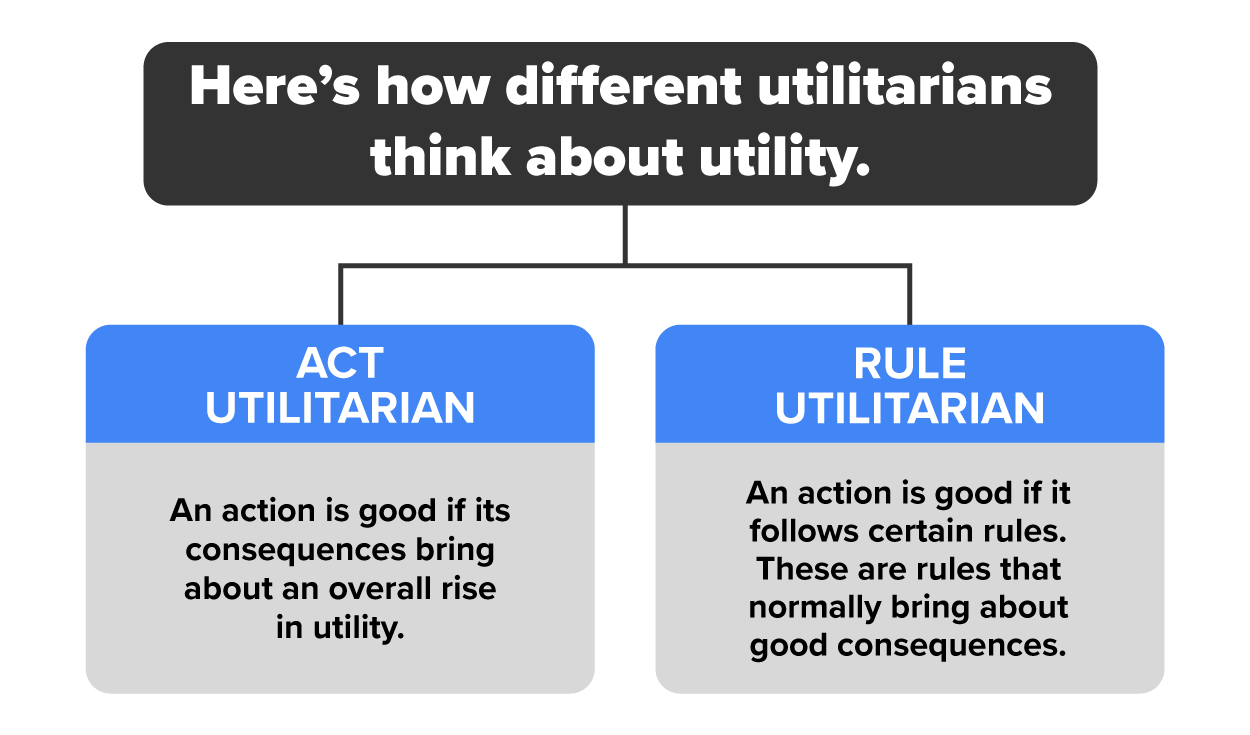Table of Contents |
To begin with, recall that utilitarianism is the name given to any ethical theory that says something is good if it brings about utility overall. This is referred to as the utility principle. The utility principle can be used in different ways, and the kind of utilitarian you are depends on how you use this principle.

You should be careful here with the term “rule.” You might think of it as something like a law, but we’re using it here to mean something more like a guide for action. If you find yourself in a certain situation, you can turn to the rule to help you decide what action you ought to take.
EXAMPLE
Consider these two rules: "If you have excess income, you should give it to charity" and "When at work, be nice to your colleagues."Most of the time, act utilitarians agree with rule utilitarians, but this depends on the specific nature of a situation.
Consider the rule that we shouldn't damage other people's property. If you damaged someone's property for fun, the act utilitarian would agree with this rule. But if you needed to break into an empty building to find shelter, the act utilitarian would disagree with the rule. The benefit of shelter outweighs the harm of damaging property.

You can think of many other cases where an action usually does more harm than good, but the balance changes under different circumstances.
EXAMPLE
Both types of utilitarian will agree that it’s bad to intentionally give a stranger wrong directions. But if you gave the wrong directions because you knew they were going to hurt someone at their destination, there would be disagreement. That’s because the act utilitarian sees that the benefit outweighs the harm in this instance: The benefit of saving someone from injury is greater than the harm of lying to someone. By contrast, the rule utilitarian would stick to their evaluation because they opposed this action due to the rule that lying is wrong.Act and rule utilitarianism have different strengths. As you probably already guessed, the strength of act utilitarianism is that it’s more adaptable. Think back to the example of damaging property. If you hold onto the prohibition on damaging property no matter what, you can overlook the utility it provides under certain circumstances. It makes sense that we should say that it’s good to break into an empty building when it means saving yourself from sleeping on the street.
The strengths of rule utilitarianism might not be so obvious, but if you think about how difficult it can be to calculate consequences, you’ll see its advantages.
IN CONTEXT
Imagine you’re walking along a bridge and you see someone is preparing to jump. If you decided to try to talk the person down off the ledge, you could be following the rule "save a life when doing so doesn’t put your own life in danger."
In this situation, it doesn't seem appropriate to take your time, calculating all the potential benefits and harms of whichever course of action you take. Think about it: While you're there tallying up consequences, the person could've jumped already.
As you can see, following a rule like this makes sense practically. Sometimes, you don’t have the time to try to calculate all the possible consequences of an action. Moreover, if you had already done research about suicide, you would probably find information to support this rule, such as that most saved people are grateful and go on to have a life with many benefits. Figuring out a rule in advance can thus be very helpful for increasing utility.